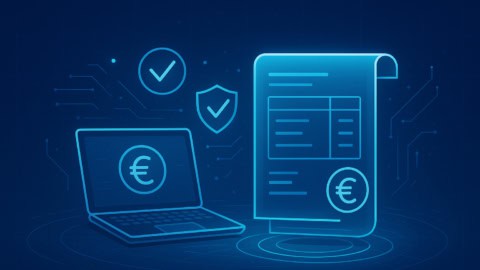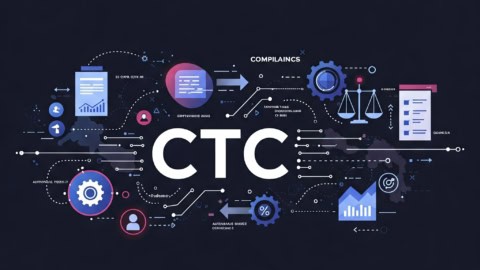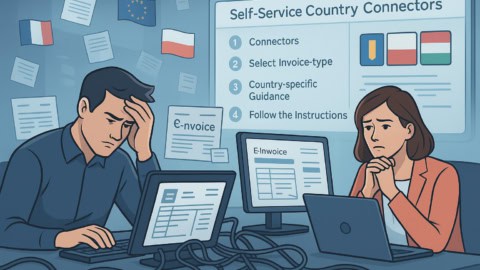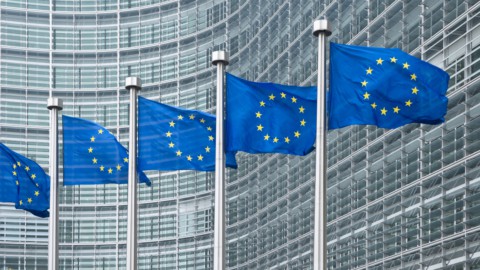E-invoicing in Germany
Compared to other European countries, Germany has rather complicated rules when it comes to electronic invoicing. This is due to the fact that regulations differ between the country’s 16 different federal states.
Since 18 April 2019 it has been mandatory for central public bodies in Germany to be able to receive and process e-invoices. Subsequently, in April of 2020 it became mandatory across all German states for suppliers to the German public sector to be capable of sending electronic invoices.
Current status of changes to German
e-invoicing legislation
On 23 February 2024 the German legislature took a step towards boosting economic growth and reducing bureaucratic hurdles with the Growth Opportunities Act. The law was passed by the Bundestag and later approved by the Bundesrat on 22 March 2024.A central component of the Growth Opportunities Act is the introduction of a new e-invoicing obligation for domestic business transactions. This modernisation is intended to optimise financial processes and reduce the administrative burden of traditional paper invoicing processes.The staggered implementation of the e-invoicing obligation is as follows:
- January 2025: all German companies must be able to receive and process electronic invoices.
- January 2027: German companies with an annual turnover of more than €800,000 must issue their invoices electronically.
- January 2028: All German companies must issue their invoices electronically.
To ensure a smooth transition, electronic invoices must comply with the EN 16931 standard. However, companies can negotiate the EDI standards as long as the invoice issuer and recipient are in agreement. This transition to e-invoicing demonstrates Germany’s commitment to technological innovation and makes German companies leaders in digital finance practices, promoting a more efficient and transparent economy.
Who will be affected?
The changes will affect all B2B transactions involving a German supplier where the goods/services in question are taxable in Germany. Once B2B e-invoicing is mandatory, all parties involved in such transactions will need the ability to create, validate, send and receive electronic invoices.
Why are these changes being proposed?
The country’s coalition government wants to simplify e-invoicing in Germany and is therefore keen to introduce a country-wide approach. The aim is not only to help to fight VAT fraud, but also to streamline the process of creating, verifying and sending electronic invoices.
How does e-invoicing in Germany compare to other European countries?
Germany is not alone in moving towards mandatory B2B e-invoicing. In Italy, Poland and Romania, for example, similar requirements are already in place. Meanwhile, several other countries, such as France, Belgium and Hungary, have publicly announced their intention to introduce similar legislation. This shift has also been accelerated by the European Commission’s recent proposal to optimise and improve VAT processes across Europe. This proposal, known as ViDA (VAT in the Digital Age) aims to simplify cross-border transactions by creating a single digital market within which businesses require only one VAT ID. And while no concrete guidelines have yet been issued as a result of this initiative, it is expected that formats compliant with the EN 16931 standard will become mandatory by 2028.
What e-invoicing standard is used in Germany?
The XRechnung is the preferred standard for B2G e-invoicing in Germany. The XRechnung standard was developed to align the EU specification to the pre-existing requirements of the German public administration. Technically, XRechnung is a Core Invoice Usage Specification (CIUS) of the EN 16931. The specification is now in force and used by national, regional and local bodies. The two supported XML formats of XRechnung are (as with the EN 16931):
- UBL (Universal Business Language)
- CII (UN/CEFACT Cross Industry Invoice)
In addition, the Factur-X (ZUGFeRD) standard can also be used if preferred, as this also aligns with the European standard. ZUGFeRD is a French/German standard which is predominantly used for hybrid invoicing*. A ZUGFeRD 2.1 invoice using the profile EN 16931 is a valid XRechnung as well.
*A hybrid invoice joins two separate types of invoice – structured format (XML) and human-readable format (PDF). This allows for automation, while still allowing for easy manual processing where necessary. Only the XML part can be used for XRechnung, however.
Is there a central German e-invoicing platform?
The current update to the German Value Added Tax Act (UStG) for B2B invoices doesn’t mandate the use of any delivery infrastructure such as Peppol. In fact, it doesn’t mention anything regarding the exchange protocol to be used. Consequently, there is also no central German e-invoicing platform.
It is expected that such a solution will be introduced at a later stage, when Germany introduces the mandatory central reporting system (aka “Meldesystem”).
Achieving compliance – what’s required?
To be prepared for the upcoming changes, businesses must have the capacity to create, transmit and receive invoices in structured formats.
It is important to note that e-invoicing does not mean simply sending an invoice electronically. For example, sending a PDF invoice to a customer does not constitute e-invoicing, as in such a transaction there is still manual effort required to extract data from the invoice and log it in the relevant place (e.g. accounting software). E-invoicing involves the automated exchange of invoice data between business partners via a computer-readable language. As opposed to more traditional invoicing methods, with e-invoicing there’s no manual data input required, as the exchanged data appears directly in the recipient’s ERP system.
To ensure you are prepared for the upcoming changes in German e-invoicing legislation, you might want to ask yourself the following questions:
- Are you able to process data automatically?
- Do you have sufficient internal e-invoicing expertise to ensure you maintain compliance with e-invoicing requirements in Germany and all other relevant countries moving forward?
- Are you confident of your ability to stay up to date with relevant e-invoicing legislation changes and update your system accordingly?
- Are message exchanges with your partners free from media breaks?
If the answer to any of these is no, you will need to optimise your existing systems/processes. As improvements can take time to implement, it’s important to start planning as soon as possible.
In more extreme cases it may be necessary to upgrade to an entirely new ERP system. However, for most businesses problems such as outdated technology and/or in-house expertise can be solved by enlisting the help of an experienced e-invoicing solution provider such as ecosio.
How ecosio can help with German e-invoicing compliance
As a fully managed EDI service provider, ecosio aims to help customers achieve maximum automation with minimum effort.
Over the years we’ve helped hundreds of businesses to implement reliable and futureproof e-invoicing systems, and are experts when it comes to optimising B2B integration.
At ecosio we don’t just provide software, or access to our network… we take care of the entire e-invoicing process for you, from initial setup right through to ongoing operation.
To find out more about how we can help, visit our e-invoicing solutions page. Alternatively, if you have any questions why not contact us directly? We’re always happy to provide assistance, and look forward to helping you implement a successful e-invoicing solution.
Are you aware of our free XML/Peppol document validator?
To help those in need of a simple and easy way to validate formats and file types, from CII (Cross-Industry Invoice) to UBL, we’ve created a free online validator.














